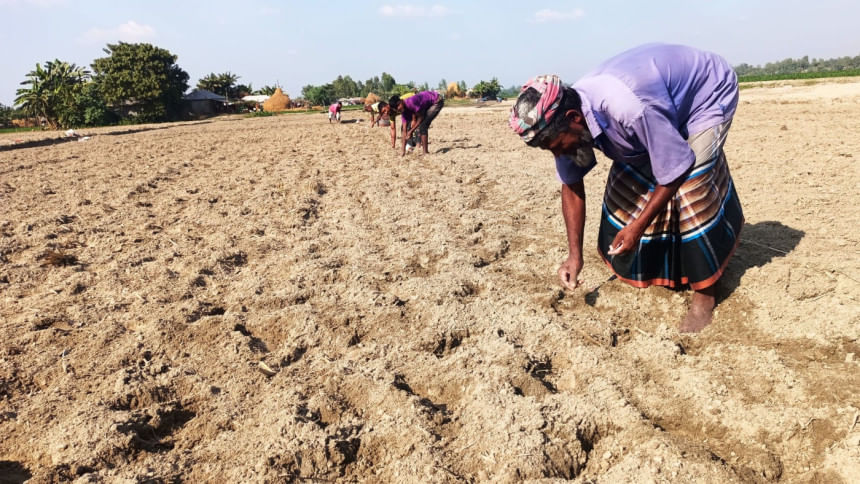Farmers struggle with non-urea fertiliser shortage in Kurigram, Lalmonirhat

With the winter crop season nearing, farmers in Lalmonirhat and Kurigram are grappling with an acute shortage of non-urea fertilisers — TSP, DAP, and MOP — leaving many deeply frustrated.Officials of the Department of Agricultural Extension (DAE), however, alleged that some fertiliser dealers have deliberately created an artificial crisis to charge higher prices, while the dealers, in turn, blame the shortage on insufficient supply.According to officials, non-urea fertilisers allocated for both...
With the winter crop season nearing, farmers in Lalmonirhat and Kurigram are grappling with an acute shortage of non-urea fertilisers — TSP, DAP, and MOP — leaving many deeply frustrated.
Officials of the Department of Agricultural Extension (DAE), however, alleged that some fertiliser dealers have deliberately created an artificial crisis to charge higher prices, while the dealers, in turn, blame the shortage on insufficient supply.
According to officials, non-urea fertilisers allocated for both the districts are adequately stocked at Bangladesh Agricultural Development Corporation (BADC) warehouse in Mahendranagar, Lalmonirhat.
Data from the DAE show that in October, Kurigram received 1,181 tonnes of TSP; 2,690 tonnes of DAP; and 1,760 tonnes of MOP. While, Lalmonirhat received 1,715 tonnes of TSP, 3,242 tonnes of DAP, and 1,044 tonnes of MOP during the same period.
However, the department acknowledged that the allocation is around 25 percent lower than actual demand.
Abdar Hossain, a farmer from Karnopur village in Lalmonirhat Sadar upazila, said, "We don't get enough fertilisers from the dealers. They often claim the stock is finished, but if we pay Tk 8–10 more per kilogram, they manage to supply it."
Abu Taleb, a farmer from Baura in Patgram upazila of Lalmonirhat, shared a similar concern: "We can't prepare our fields without non-urea fertilisers. If we don't get them in time, our crops will suffer badly. The demand will rise even further in November."
At Singerdabri village of Rajarhat upazila in Kurigram, farmer Motaleb Hossain said, "It is impossible to prepare land without TSP, MOP, and DAP. We need non-urea fertilisers every day."
Dealers, on the other hand, claim they are receiving less fertiliser than required.
They said the stocks they collect from the warehouse run out within a week, leaving many farmers disappointed. Dealers added that due to increased vegetable cultivation in the region, demand for non-urea fertilisers has surged. They argued that such shortages would not occur if the government supplied fertilisers according to current demand.
Abu Taher, a fertiliser dealer from Harati union in Lalmonirhat, refused the farmers allegation of extra charge saying, "We sell fertilisers at government-fixed prices. No dealer sells at higher rates."
Abdul Hakim, president of the Lalmonirhat District Fertiliser Dealers Association, said, "The shortages happen because allocations are lower than demand. Farming has expanded in the riverine char areas, which has also raised fertiliser needs. If the government continues the 2009 fertiliser distribution policy and supplies according to demand, there will be no crisis."
He added that any dealer found responsible for creating an artificial shortage should face legal action.
Ekramul Haque, assistant director of the BADC warehouse in Mahendranagar, said, "There are 167 dealers in Kurigram and 144 in Lalmonirhat who sell fertilisers at government-fixed prices. The government sells TSP to dealers at Tk 25 per kg, DAP at Tk 19, and MOP at Tk 18. Dealers can make a profit of Tk 2 per kg while selling to farmers. The government provides subsidies ranging from Tk 55 to Tk 80 per kg."
He added that all fertilisers allocated by the government are available in stock, and dealers are collecting and selling them following official procedures.
Md Saykhul Arifin, deputy director of the Lalmonirhat DAE, said, "There is no real shortage based on government allocations. Some dishonest traders are deliberately creating artificial scarcity to make extra profits. Mobile courts are already operating against them."
He noted that a new fertiliser policy has been finalised and will take effect in January next year. "Once implemented, dealers will no longer be able to manipulate supply," he said.
Abdullah Al Mamun, deputy director of the Kurigram DAE, said, "No land in the char areas remains fallow anymore, which has increased fertiliser use. Many farmers are also applying excessive fertilisers and pesticides without consulting the agriculture office, leading to unnecessary costs and soil degradation."
He, however, claimed that there is currently no actual fertiliser shortage in Kurigram.